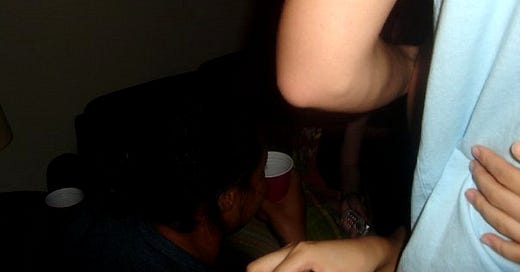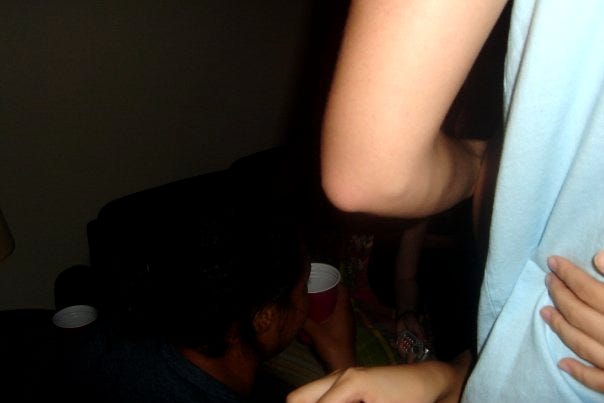Self-aware villains, tech secessionists and a theory for why everything's getting worse
Plus: What was the Facebook party album, c. 2008 or so?
I am at an age and a point in my life where Facebook serves exactly one use: the acquisition of affordable second-hand home goods.
Since roughly 2012, when Boomer memes and high school frenemies began to overtake my feed, America’s second most popular online platform hasn’t felt particularly relevant to me.
But then I read this story by my former colleague Maura Judkis, written on the occasion of Facebook’s 20th anniversary, and years of memories flooded back. The piece resurfaced a set of very familiar (and very forgotten) early-Facebook behaviors. Like this:
You may have attended a very ordinary party and posted 28 photos taken on a digital camera of your friends in various states of inebriation, tagging them all, in an album with song lyrics as its title.
It’s the specificity of this sentence that really gets me — that, and perhaps the fact that nine-tenths of my Instagram contacts seem to have raided their Facebook party albums in fulfillment of a recent Instagram trend. It’s called “you at 21,” it sounds like what it is, and it has crowded my Stories with flash photos of young women wearing Express halter tops and gripping red Solo cups in their unwrinkled hands.
The Facebook party album, circa 2008, was a genre and a ritual onto itself. And like many things that defined the millennial youth experience … it has wormed its way into the discourse again!
I, for one, am delighted by this, because I am an aging millennial because I maintain that the Facebook party album was a fascinating, momentary sociological spectacle. You think it’s a collection of drunken photos — and you’re right! But the conventions of the genre were also odd and wonderful.
For instance: the repeat uploading of five or 10 or 20 near-identical pictures, like successive slides from an old-fashioned animation reel. The documentarian impulse to record friends and acquaintances doing absolutely nothing of aesthetic interest (talking, adjusting a bra strap, pouring beer). The endless permutations of posed photos, like someone sprung one of those real-world math problems on a drunken group of undergrads: If A, B, C, D and E are at a party, how many discrete combinations of the five friends can we photograph?
It makes more sense, actually, if you think of Facebook party albums less as visual archives and more as a kind of cipher for late-adolescent relationships. The purpose was never to share aesthetically good or flattering images — it was actually, literally, to complete that real-world math problem, to stake out and claim the ever-shifting topography of your college friends.
Was this a like-and-comment friendship? A passive tag-yourself friendship? A friendship that occasioned inside jokes in the captions? (One 2014 study found that the number of likes and comments on a Facebook photo album could, in fact, predict the trajectory of a relationship.) Personally, I cycled through several friend groups in high school and college, and I think I craved clear signals of where I stood. The party album gave me that — as did the Myspace Top 8 before it, or a certain type of cliquey AIM away message.
For Maura, the author of that Facebook piece, party albums also stemmed from what she calls “a bit of insecurity … that was unique to Early Facebook.” But the photos played something of a cohesive role, too.
“I think those photos cemented a lot of friendship bonds,” she told me this week. “I loved getting tagged in other people's party photos even if they were a little bit unflattering (most of them were) because it meant they liked me enough to document our time together. That's a form of friendship currency that you only get from maybe a grid Instagram post now — and regrettably, I don't post to the grid very much anymore either.”
How do we map our friendships now, I wonder? How do we stake digital claims to our friends? It’s easy to dismiss the Facebook party album as an adolescent gag, but I suspect the instinct to mark our people just moved underground when we abandoned timeline and the albums that fed it.
The writer and editor Sophie Haigney recently ascribed a similar purpose to group chats, with their overlapping memberships and clear in/out divisions: “The dynamics of group chats — who is in them, who is not — might seem like the adult version of kids’ jockeying for a lunch table,” she said.
Maura points to her Instagram stories, “because they're casual and slapdash in the way that party photos used to be, but they also serve the slightly braggy purpose of telling people where I am and who I'm with if I'm having a lot of fun somewhere.”
I’d say the Instagram grid post still reigns as the strongest public digital, signal of relational closeness, at least in my particular social set. (Case in point: I just checked the Instagram grid posts I’ve been tagged in, and they are largely … my husband’s!)
But no one posts to the grid anymore — those public signals are fading out. Maybe we’re all old enough to articulate our friendships in other, healthier!, more direct ways now.
P.S. If you’re looking for more on Facebook’s 20th anniversary, I liked this big-picture overview in The Economist and this wonderfully cynical take from A.W. Ohlheiser at Vox — which asked a number of writers, me included, what they believed Facebook’s “worst day” was.
If you read anything else this weekend
“‘Enshittification’ Is Coming for Absolutely Everything,” by Cory Doctorow for The Financial Times. I was intrigued when I spotted this profane buzzword in a mainstream newspaper headline, and baffled — awed? — to read “fuckability” in the sixth paragraph. But I understand why FT’s editors didn’t censor Doctorow, a theorist and internet activist who has managed to condense all the inscrutable and deeply boring economic forces that ruined social media into a unifying theory that’s somehow both very smart and also very readable. If you have ever found yourself asking “why does it seem like everything online has gone to shit?” … then this belongs at the top of your reading list.
“Over Three Decades, Tech Obliterated Media,” by Kara Swisher for New York. This excerpt from Kara Swisher’s forthcoming memoir ostensibly traces the competition between tech and mainstream media, but let’s be real — the real draw here is all the tea Swisher, a tech reporter of almost 30 years, spills about the world’s richest and most powerful people. Mark Zuckerberg is a skittish crybaby who can’t speak in public. Elon Musk is an “arrogant amateur.” Tech executives: They’re just like us! Except fabulously wealthy and, as previously mentioned, running the whole damn world.
“Masturbation Abstinence Is Popular Online. Doctors And Therapists Are Worried,” by Lisa Hagen for NPR. I’m grateful to have lived long enough to see public radio define “nofap” (“a play on an onomatopoeic word for masturbation popularized on the notorious 4chan”). Nofap ideology runs through a string of far-right movements, from white supremacists to MRAs and misogynists of all stripes. Once again, I find myself asking: Are men all right??
“Meet Me in the Eternal City,” by Kaitlyn Tiffany for The Atlantic. “Network state” sure sounds a hell of a lot more marketable than “eugenics-adjacent libertarian resort run by crypto bros,” and yet … it would appear the movement still has an image problem! This dispatch, from the recent Montenegrin conclave where network stateists pitched their plans for new, self-governing societies in tax havens around the world, is rich in jabs and ironies and extraordinary quotes. If only the ~elites~ at Zuzalu would turn their high IQs to the public good.
“Confessions of an AI Clickbait Kingpin,” by Kate Knibbs for Wired. Nebojša Vujinović Vujo should be a villain: The Serbian domain-squatter/Balkan folk DJ (truly, you could not make this shit up) scoops up shuttered news sites, repopulates them with AI-generated clickbait and reaps the ad dollars. But I found I couldn’t really hate the guy, who seems affable and honest and at least mildly self-aware: “I’m just one guy who … [is] using AI to create shitty content on the internet.”
👉 ICYMI: The most-clicked link from last week’s newsletter was this dispatch from the Mrs. World pageant, ft. Ballerina Farm.
Postscripts
Boysober. TikTok voice. “Evidence maximalism.” A (thought-provoking!) apologia for paid online reviews and a literary analysis of Trump’s fundraising emails. How AI (and … 22-year-olds?) could unlock scrolls from Pompeii. How Libs of TikTok sparked a string of bomb threats. In defense of ~algorithms.~ Vision Pro buffoonery. “My comments are in the Google Doc linked in the Dropbox I sent in the Slack.”
Why does TikTok append sensitive terms to otherwise banal searches? What kind of country normalizes crowdfunding for basic healthcare? Turmoil at the company that keeps extremists online. Stop trying to make TikTok buzzwords happen. I really can’t imagine having the free time these women-hating lowlifes seem to have. The BookTok-fueled rise of “romantasy.” I’d actually like fewer social networks, thanks. Last but not least, in Gen Z curiosities: sex-life spreadsheets and friend applications.
Until next week! Warmest virtual regards,
Caitlin






Hi Caitlin, I'm Bob Pohl. The person who wrote the Literary Notes column and curated the weekly poetry page in the Buffalo News for nearly 38 years. Just wanted to tell you, as a boomer (lol!) and someone writing a "deaccelerationist poetics" (poetics in the Aristotelian sense), that this newsletter is my favorite and most useful Substack I subscribe to each week.
That said, have you read this NYT piece by Allie Rowbottom that was published this week? I don't know Allie Rowbottom personally, but she is a friend of a friend, and one of the most prominent literary "It" girls on the Brooklyn/Dime Square scene these days. Here's the link:
https://www.nytimes.com/2024/02/09/style/technology-love-technosexuals.html
I love(d) this newsletter - the Facebook party albums? What a throwback! I was definitely the girl with the digital camera who took all of the pictures, haha. As for the postscripts, the piece on deciphering the ancient scrolls of Pompeii was AWESOME!